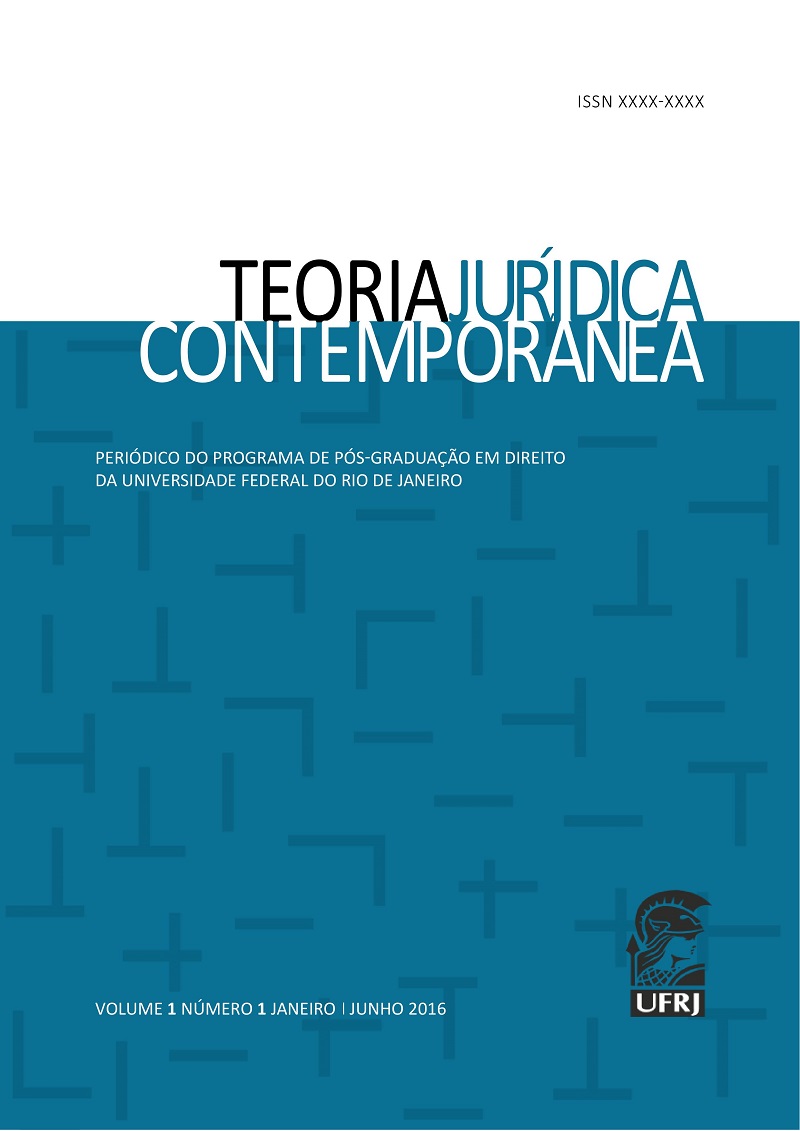Peculiaridades da argumentação sobre fatos no campo do direito
DOI:
https://doi.org/10.21875/tjc.v1i1.3412Palavras-chave:
Argumentação jurídica, Argumentação sobre fatos, Inferência à melhor explicação, Legal Reasoning, Factual Reasoning, Inference to the Best ExplanationResumo
Resumo: A argumentação jurídica é frequentemente caracterizada como uma espécie particularmente formal, engessada ou “institucionalg de argumentação. Autores que concordam com essa caracterização da argumentação jurídica costumam ter em mente argumentos jurídicos práticos, como o silogismo jurídico, as analogias jurídicas, os argumentos baseados em precedentes judiciais etc. O principal objetivo deste artigo é mostrar que a mesma ideia é aplicável à argumentação sobre fatos: argumentos sobre fatos também costumam ser particularmente institucionais quando formulados dentro do processo legal. Para mostrar que esse é o caso, contrastamos o uso de “inferências à melhor explicação” no contexto legal com o emprego científico dessa forma importante de inferência.
Abstract: Legal reasoning is often characterized as a particularly formal, constrained or "institutional" type of reasoning. Authors who agree with this characterization of legal reasoning are usually concerned with practical arguments, such as the legal syllogism, legal analogies, precedent-based reasoning, and so on. The main goal of this paper is to show that the same general idea applies to arguments about facts: they tend to be particularly institutional when formulated within the legal process. To establish this claim, we contrast the use of "inferences to the best explanation" in the legal context with the way in which this important form of inference is used in scientific inquiry.
Referências
AMAYA, Amalia. Inference to the Best Legal Explanation, in: KAPTEIN, Hendrik; PRAKKEN, Henry; VERHEIJ, Bart (Eds.). Legal Evidence and Proof: Statistics, Stories, Logic. Aldershot: Ashgate Publishing, 2008. p. 135-159.
FRANKFURT, Harry G. Peirce's Notion of Abduction. Journal of Philosophy, v. 55, n. 14, p. 593-597, 1958.
MACCORMICK, Neil. Argumentation and Interpretation in Law. Ratio Juris, Bologna, v. 6, n. 1, p. 16-29, March 1993.
MACKONIS, Adolfas. Inference to the Best Explanation, Coherence, and Other Explantory Virtues. Synthese, v. 190, n. 6, p. 975-995, 2013.
OKASHA, Samir. Philosophy of Science: A Very Short Introduction. New York: Oxford University Press, 2002.
PARDO, Michael; ALLEN, Ronald. Juridical Proof and the Best Explanation. Law and Philosophy, v. 27, n. 3, p. 223-268, 2008.
PRAKKEN, Henry; SARTOR, Giovanni. The Three Faces of Defeasibility in the Law. Ratio Juris, Bologna, v. 17, n. 1, p. 118-139, 2004.
SCHAUER, Frederick. Thinking like a Lawyer: A New Introduction to Legal Reasoning. Cambridge (MA): Harvard University Press, 2009.
SINNOTT-ARMSTRONG, Walter; FOGELIN, Robert. Understanding Arguments: An Introduction to Informal Logic. 8. ed. Belmont: Wadsworth Cengage Learning, 2010.
STRUCHINER, Noel; SHECAIRA, Fábio. A Distinção entre Direito e Moral e a Distinção Moral do Direito. Revista de Direito do Estado, v. 22, p. 131-145, 2012.
SWIFT, Jonathan. Viagens de Gulliver. Tradução Octavio Mendes Cajado. São Paulo: Abril Cultural, 1983.
TUZET, Giovanni. Usos Jurídicos de la Abducción. In: GARCÍA AMADO, Juan Antonio; BONORINO, Pablo Raúl (Coords.). Prueba e razonamiento probatorio en derecho: debates sobre abducción. Albolote: Editorial Comares, 2014.
WELLMAN, Carl. Challenge and Response: Justification in Ethics. Carbondale: Southern Illinois University Press, 1971.
Downloads
Publicado
Edição
Seção
Licença
Os autores que publicam nesta revista concordam com os seguintes termos:
- Os autores mantêm os direitos autorais e concedem à revista o direito de primeira publicação, com o trabalho simultaneamente licenciado sob a Licença Creative Commons Attribution que permite o compartilhamento do trabalho com reconhecimento da autoria e publicação inicial nesta revista.
- Os autores têm autorização para assumir contratos adicionais separadamente, para distribuição não-exclusiva da versão do trabalho publicada nesta revista (ex.: publicar em repositório institucional ou como capítulo de livro), com reconhecimento de autoria e publicação inicial nesta revista.
- Os autores têm permissão e são estimulados a publicar e distribuir seu trabalho online (ex.: em repositórios institucionais ou na sua página pessoal) a qualquer ponto antes ou durante o processo editorial, já que isso pode gerar alterações produtivas, bem como aumentar o impacto e a citação do trabalho publicado (Veja O Efeito do Acesso Livre).
Este obra está licenciado com uma Licença Creative Commons Atribuição-CompartilhaIgual 3.0 Brasil.


